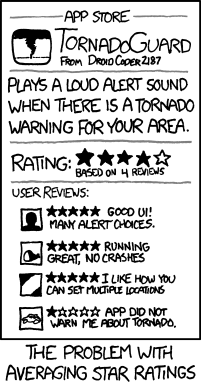Lately I've been thinking about something called Standards-Based Grading (SBG). The idea is that rather than evaluating students' performance on a given set of assessments, you give them opportunities to demonstrate what they know. They're scored on whether or not they master certain skills, and they can try multiple times to master each skill. Lots of people have been discussing SBG lately, I would recommend reading through the links below if you're interested (I also borrowed most of the images from links these people provided).
 |
| http://tinyurl.com/88g3tqo |
Action-Reaction
dy/dan
MeTA musings
Physics! Blog!
Student Perspective
I really like the idea of SBG, but I don't think that integrating it into a Regents course is as easy as snapping your fingers. I think it has to be done carefully and intentionally (and possibly with student input). I envision a grading breakdown that is a combination of traditional scoring and SBG. It might look something like this:
 |
http://xkcd.com/937/ |
Current:
| Class Participation | 20% |
| Homework | 25% |
| Labs | 25% |
| Quizzes | 5% |
| Tests | 25% |
New:
| Class Participation | 20% |
| Labs | 25% |
| Assessments | 10% |
| Performance | 45% |
By assessments I mean timed problem-solving sessions. I don't like teaching to the test, but I feel that there is a necessity for students to be able to perform under pressure (to a degree) and since the majority are going to be sitting for the NYS Regents Exam in Physics in June, I feel that this element is necessary. It shouldn't be the over-riding factor in their grade, but I think it should play a role. What do you think? Bueller?
I've considered doing away with the separate lab grade... maybe someday. If I were given blocked-ish periods with the same students in class and then lab (or vice-versa) then I could do this more easily. In fact, I would lean toward eliminating the lab report requirement of my class because I would finally have enough time for students to put together meaningful representations of what they're learned. Maybe this last bit is just a fib and I should can it right now... I'll have to think about that. I'm interested to see how Shawn Cornally's collaboration experiment goes: http://shawncornally.com/wordpress/
 |
| Emma back when she was a puppy |
 |
| http://tinyurl.com/7t6nnfb |
Stay tuned for updates, and if you have an opinion about any of this stuff, leave a comment below!
No comments:
Post a Comment